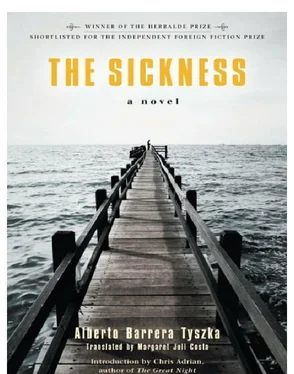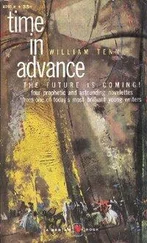From the Hotel Humboldt, near the cable-car station, you can’t see the city and the sea at the same time simply by turning your head. There are no enormous rocks and not even the sun seems quite so close. Andrés takes his nostalgia for a walk. Even at that age, when he wasn’t yet fifteen, he dreamed of becoming a doctor. If he were asked to say precisely when and how he decided to study medicine, he would have to think about it for a long time. People see sickness as a definitive sign: the body within the body, a sign that is at once troubling and disgusting. Perhaps that’s why it’s usually assumed that medicine is a stubborn, obstinate vocation, almost genetic in its purity: you’re born a doctor, born without a fear of peering into other people’s bodies and with strength enough to cast an unflinching eye upon other people’s blood.
Andrés, however, doesn’t feel this is so in his case. He thinks that, for him, medicine was, at first, born more out of curiosity than out of a sense of vocation. He’s never believed that being a doctor is a variant of being a missionary, an almost religious calling, a kind of voluntary service based on a charitable impulse or on the ideal of spending one’s life saving other people. Medicine isn’t a human quality, it isn’t a virtue.
When he scrutinizes his memory, he always bumps up against the same image: one morning, very early, on El Agua beach, on Isla Margarita. Andrés would have been ten years old, and his mother had just died. Perhaps that’s why his father decided that the two of them should go and spend a week on the island. They traveled by ferry, naturally. It was part of a family plan to dismantle the apartment in Caracas and cleanse it of any hint of his mother’s presence, so as to spare him further traumas. His father took him to the beach while his sisters-in-law checked the shelves and divided up the clothes, the jewelry, and any other belongings that had survived the fatal air crash. On their return, he and his father would find a place with less of a past. The void was preferable. It would be less painful.
They caught the ferry in Puerto La Cruz. It was a noisy old boat. Andrés felt as if he were boarding a rusty whale. It was a real adventure. He ran about on the deck, spent hours watching the sea, waiting for the dolphins to appear, leaping among the waves. He had never been on a ferry before. He had never been on an island. When he remembers it now, he thinks how terrible those same moments must have been for his father. There is Javier Miranda, widower, and his ten-year-old son.
“Come on,” he keeps saying. “What do you want to do next?”
He shows him the sea, points at the curling waves, remains watching by his side, waiting for surprising animals to emerge from the water. There he is, doing everything he can to make his son forget, to stop him missing his mother, to fill up his mother’s absence with sun and salt water. The Caribbean is trying to conspire against Freud. Andrés runs to and fro while his father grants his every whim, buys him an orange drink, buys him a fish pasty; when, at last, they spy the coast of the island, the port of Punta de Piedras, they both lean on the rail to witness that encounter with the land. His father tells him about the beaches that await them, of the wonderful time they’re going to have. That was his way of mourning: organizing a party for his son.
Over the years, Andrés had gradually managed to track down his first flicker of interest in medicine to that time, to that week on Isla Margarita. It happened on the third day. His father always got him up very early, as if he were afraid that Andrés might wake alone, as if he didn’t want him to have a moment without some stimulus, some distraction. As soon as the sun rose, his father would get him out of bed, always eager to invent some new surprise, some new adventure. The previous day they had gone fishing, without success. That morning he proposed running down to the beach to look for jellyfish. At that hour, when the light was still weak and the sand cold, they would be sure to find a few lost among the last fingers of the waves. Some of those white medusas, which could sting you when in the water, always got washed up on the shore during the night. The less cautious, the less experienced, the fat and the flabby, didn’t make it back, but remained there on the sand, along with other detritus from the sea, condemned to a slow death, drying up and suffocating in the air and the sun.
Andrés only woke properly when the icy water touched his feet. They walked for nearly half a mile but found only one small jellyfish. However, parked on the sand at the end of the beach was a police car. Next to it stood a group of officers. He and his father ran toward them. A man’s body lay on the sand. His clothes were slightly tattered, his skin purple, and his lips very swollen. Out of the cavity of his right eye sprouted some yellow foam, like very pale broccoli, like some sort of soft coral emerging from the man’s head. Javier Miranda squeezed his son’s arm and tried to drag him away, but Andrés stayed where he was, absorbed, studying the body. The policemen gave some vague explanation. The man wasn’t a tourist. They assumed he was a local fisherman. They were waiting for a pathologist to arrive and examine the body.
“He’s alive!” said Andrés in an anxious, childish voice.
While his father was listening to what the policemen had to say, Andrés, intrigued, had gone closer to the body. He heard it breathe. He saw the gaping mouth, saw the fat lips tremble slightly; he crouched down and once more heard the man breathe.
“He’s alive!” he said again, shouting this time.
Only his father hurried over to him and took his hand. The officers looked at each other and smiled. One of them laughed out loud. Or that, at least, is what Andrés remembers.
“He’s breathing,” he murmured rather sadly, while his father drew him away from the corpse.
“No, he’s not,” said the policeman. “Listen, kid. What you can hear is the water moving around inside the body. That’s all. Listen,” he repeated, crouching down beside him. They all stayed still for a moment in expectation, and a liquid whisper slipped out onto the air. “Did you hear that? It’s just water. But the guy’s dead alright.”
Andrés was astonished. He imagined that body full of sea, full of water that came and went, that made noises, that went round and round, unable to escape. He thought of it as a secret room, in which the water could circulate freely. That morning, Andrés thinks, marked his initial curiosity about bodies, the discovery of the existence of an order distinct from words, more physical, more tactile, less invisible. His father had to drag him away. The boy wanted to wait for the pathologist to come, he wanted to know what would happen next. His father, of course, feared that the incident would lay bare the very loss he was trying to conceal. One death calls to another. A stranger’s body lying on the sand was also the body of the mother, floating and turning between them, surrounding them, drenching them.
Andrés cannot remember there being any further consequences. He can’t, for example, remember if it was that same day that he spoke with his father about the death, about the plane exploding in midair; he can’t remember if his recurring dream came before or after that morning spent hunting for jellyfish on the beach. He merely pinpoints that moment, almost fancifully, as a first image of his vocation. At seventeen, when he finished high school, he decided to study medicine — in a rather childish way, as is always the case at that age — and he still felt driven by that same curiosity, by the desire to find out what went on inside our bodies.
It’s seven o’clock when he comes down from the mountain. There’s no one else in the cable car. He feels that chance has handed him a rare privilege. The journey back to the city reveals an extraordinary landscape. The illuminated lines of the highways, the lights of the suburbs and the barrios, draw a different map in the darkness, that of an unfamiliar, almost unreal city: a stationary landscape, bereft of movement, a Caracas conjured up in that very moment that will surely disappear as soon as he enters it again. Suspended in the air, almost hanging above the distant precipice that is now the city, Andrés makes a decision, rings his father’s number from his mobile and says:
Читать дальше












